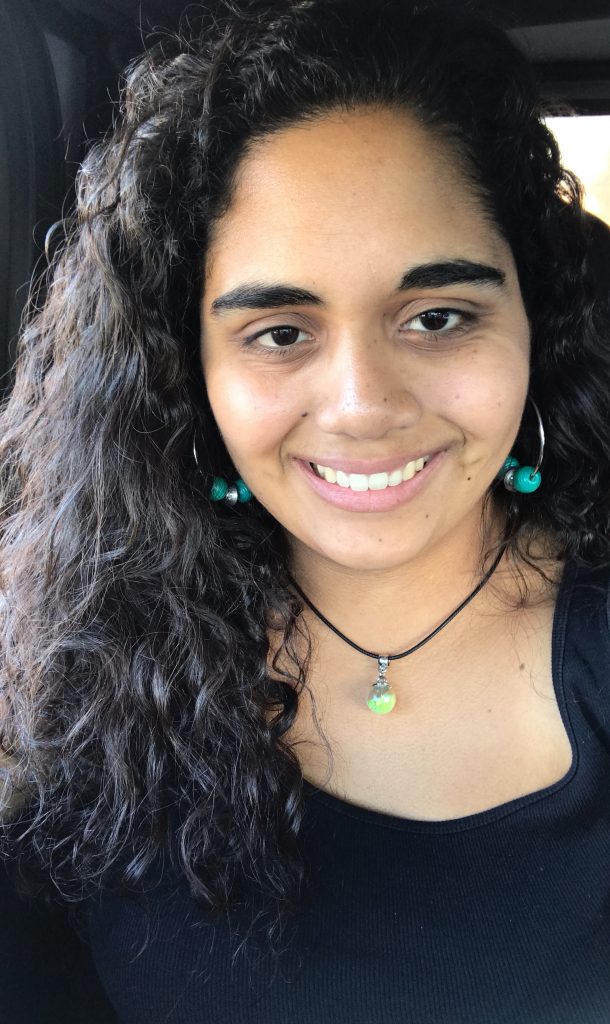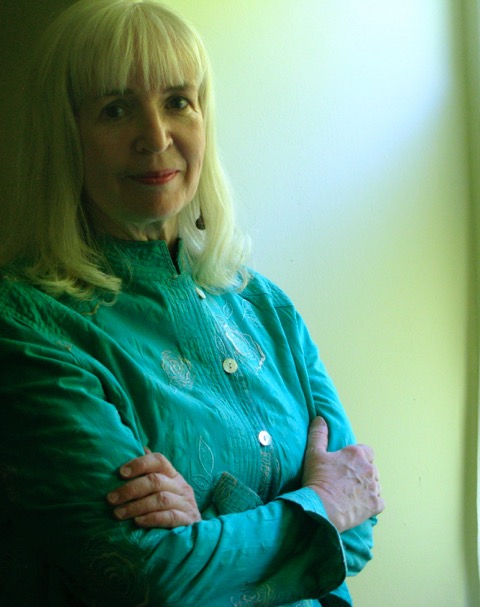
About our interviewer: Krystal Galvis, born and raised in San Diego, California, is a writer fascinated with magic, fantasy, and darkness. She is an MFA graduate student at San Diego State University studying creative writing. Outside from writing short stories and poems, she researches any Latinx fables or mythology and goes on long walks at the beach. Her published work appears in Feminine Collective Literary Magazine and you can find her on twitter @Kbgcali

About the author: Margaret Hermes’s story collection, Relative Strangers (Carolina Wren/Blair), was chosen by Jill McCorkle as winner of the Doris Bakwin Book Award and given a special second place award in the 2012 Balcones Fiction Prize competition. Dozens of other stories have appeared in magazines and journals such as The Missouri Review, the Laurel Review, and The Literary Review. Several have also won or been finalists in competitions (Glimmer Train, River Styx, and others).
Her published/performed work includes a mystery novel, The Phoenix Nest, and a stage adaptation of an Oscar Wilde fable, The Birthday of the Infanta. When not writing, Hermes concentrates on environmental issues. Feel free to visit Margaret Hermes’ Website or Facebook.
KG: What motivated you to write “Dust?” Had you written this story before noticing Fiction International’s theme or did the theme inspire you to write it?
MH: I had worked on “Dust” over a period of years, so I wasn’t inspired by Fiction International’s theme to write the story, but the theme of “World in Pain” certainly inspired me to send it.
Like in much of my writing, many real-life threads came together to weave this fiction. The double-named Vietnamese-American was a boy I knew who chose his best friend’s name for his Confirmation name though it was identical to his “American” first name. A man once confided that his beloved, the child of Vietnamese refugees, rejected the possibility of ever introducing him to her parents. A first-generation Vietnamese-American told me of his mother’s fear that he would swallow dust along with their meals unless he sat very still. These cultural carry-overs can sometimes be heavy weights, even as they are connectors.
St. Louis is home to different waves of immigrants, including from Vietnam, a later tsunami from Bosnia – St. Louis holds the largest population of Bosnians outside of Europe – and more recently from Afghanistan. My experience with refugees from Bosnia and Afghanistan showed me the sense of loss that permeates daily life after flight from a war-torn homeland.
KG: Names often have a powerful meaning. But in your story, you wrote that “it’s not what a person is called, but how. It is the feeling that goes into the speaking of the name — not the pronunciation or the meaning.” Can you elaborate on this?
MH: Sure, there is such a range of names and their meanings embedded in the story and its references. Rainbow is the first name I explore – and the last — in order to talk about a moment in time and inherited cultural expressions. While the protagonist, Hien, sums up with the declaration that a name in and of itself is not what’s important, I use names as the story’s knots, conjoining people with one another and with their families’ pasts. Hien dwells on the Vietnamese meaning conveyed by his given — and later taken — name as well as those of the refugee girl he has grown up with and of his aunt who still lives in Vietnam. Those meanings are important, maybe even determinant. He learns that his own first name, the name by which he is known to himself and called by his parents, was not originally his – it had always belonged to someone else. Coincidentally (or not), the book on my nightstand as I write this is Jose Saramago’s All the Names with the epigraph “You know the name you were given, you do not know the name that you have.”
Psychological, as well as physical, dislocation strikes me as an aspect of the refugee experience in general and plays a role in the very particular experience of this narrator. Unlike the immigrants who passed through Ellis Island and sometimes were assigned an “Americanized” name by an arrogant clerk, refugees are not leaving the place of their birth for a better life – although this, too — they are fleeing for their lives. People who are escaping war or famine or the aftermath of natural disaster can in the process lose nationality, culture, connections, of course property and belongings, and even identity.
So, while the narrator finally learns the truth (or one truth) of his family’s history, the emphasis on names shows the tentacles of that history reaching into his life.
KG: What made you decide on “Rainbow” as the name for the girlfriend?
MH: I chose the name Rainbow for the main character’s girlfriend because I both wanted to let the reader know from the outset that the story hinges on names and to establish a sense of “otherness” across all the characters. And because I imagined the reader wincing and instantly acknowledging the burden that a name can impose on the bearer, as well as the rather remarkable resignation most of us submit to in accepting the name assigned us by our parents.
One of the pleasures in writing fiction is the experience of making a choice and then discovering what rabbit hole it takes you down. The naming of Rainbow led me to the folks who would do that to their daughter, her hippie parents, her abdicant father and her jangling, self-absorbed mother.
KG: Are there any books that you’ve read recently that you would recommend to emerging writers?
MH: I just finished Kate Atkinson’s Life After Life, a novel that might have been crafted with the theme of a “World in Pain” in mind. World War II provides the canvas, England and Germany the pigments. Atkinson paints scene after scene, life after life, offering alternate versions of the lives of characters and the characteristics of countries. The person we accompany on this journey from birth through adulthood and through various lifes and deaths is Ursula, but then we find that the main character is really potentiality itself.
Before that, I read Divisadero by Michael Ondaatje, in which one horrific explosion of violence divides a makeshift family and redirects — or misdirects— their lives. But it is loss that has brought this foursome together to begin with. The novel moves across starkly different landscapes where the characters are leading their disrupted lives that have echoes in the life of a dead French poet and novelist that one of the sisters is researching.
That was preceded by Eat the Apple, a young marine’s recounting of his deployments in Iraq. Matt Young’s memoir is raw, rough, and real. Hard reading.
KG: Any old favorites that you think are a must read?
MH: Anything by Ondaatje. And Ondaatje can write about absolutely anything. In prose or poetry. I think Coming Through Slaughter is stunning. It’s the fictionalized story of the real life jazz musician Buddy Bolder set in the Storyville district of New Orleans. The writing itself, with its riffs, reads like a jazz composition sounds.
I like singling out the less known work by a celebrated author that has left a lasting impression on me. The Blind Assassin is a guilty favorite as it’s more of a potboiler (well, three potboilers actually) than vintage Margaret Atwood, but it’s loaded with entertaining quotes and heavily cloaked (weighed down?) with enigma.
I think any practitioner — or admirer — of the short fiction form should read the Collected Stories of William Faulkner. Just plain wonderful.
Milan Kundera’s Immortality. I found The Unbearable Lightness of Being and The Book of Laughter and Forgetting thoroughly engrossing and Immortality thoroughly challenging. I keep intending to read it again . . .
Paddy Clarke Ha Ha Ha by Roddy Doyle, set in a low-income neighborhood of Dublin. Funny and heart-breaking.
When thinking about dialogue and the writing of dialogue, I’ve been known to read plays. Tennessee Williams, Tom Stoppard, John Osborne, Oscar Wilde, Henrik Ibsen, Robert Bolt, Edward Albee, Sean O’Casey. I listen to the voices, the give and take. It’s an exercise I would recommend. Also, I go to see plays, three in the last week! One of those was a staged reading of Quiz Out by Margot Connelly about a pair of uber-Christian teens who are lesbians and teammates attending Bible Quiz tournaments.
KG: What do you most hope readers walk away with from this short story?
MH: Naturally I’d like them to care about the characters, but ideally the chief takeaway would be a more deeply felt understanding of the layered lives of refugees.
Not just the horrors of war and persecution, though of course there is that. At the apartment of recently arrived refugees from Afghanistan, I’d been invited to meet their visiting relatives who had just settled in Canada. All of the women were crowded into the kitchen, but I was led to an honored place among the men in the living room as I’d been helping the host family navigate their new world and secure some services. A sheaf of photos was being passed from hand to hand with comments made in Farsi. I waited for my turn, expecting to see pictures of more of their relatives. And for all I know, that’s what I did see. All the photos were of bloody victims, maybe some from bombing, but mostly torture, with missing limbs or digits. I dropped the photos and headed for the kitchen. Someone followed to give me a one-word explanation that I could understand without a translator: “Taliban.”
Fortunately, most of us can’t imagine what refugees endure before finally settling in a foreign land, but I would hope that we are sympathetic to the residue of having to leave home and leave behind so much that can never be replaced. At a time when distorted stories of migration are being foisted upon people, I feel it is important to look at the deeply human stories of those who make up the fabric of these dispossessed communities everywhere.
Be sure to get the newest issue of Fiction International with the theme of “World in Pain” where you can read Margaret Hermes short story “Dust”.